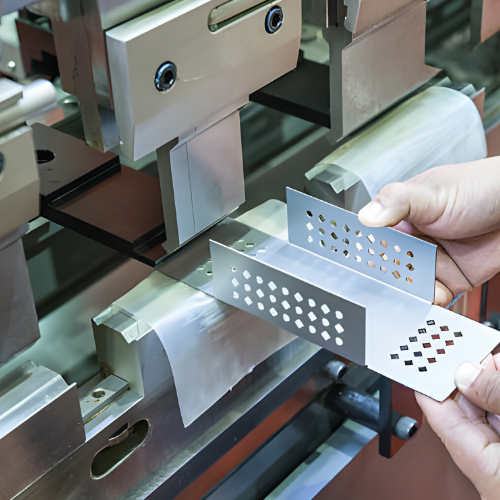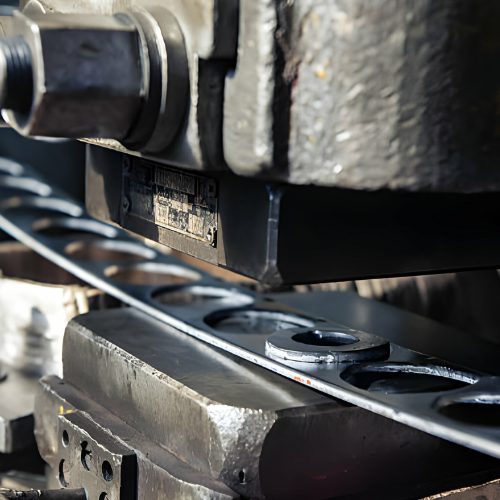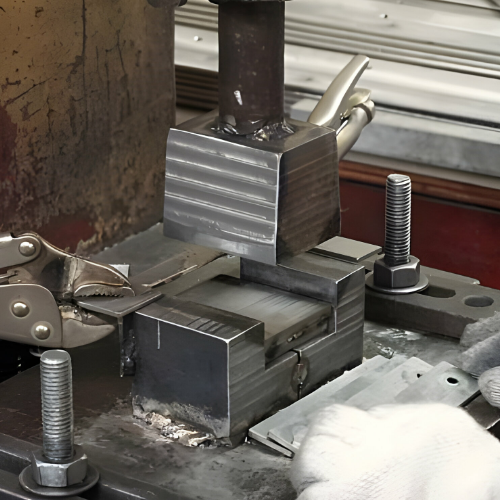Metal Stamping

Metal Stamping
Metal stamping is a cutting-edge manufacturing process that involves shaping flat metal sheets into intricate designs and components using specialized dies and presses. This versatile technique produces high-quality, consistent parts with exceptional precision, making it an ideal solution for various industries seeking reliable and cost-effective manufacturing solutions.
Metal stamping, the cornerstone of modern manufacturing, is a technique that transforms flat metal sheets into intricate components with remarkable precision. Our advanced process involves cutting, bending, and shaping metal to exact specifications, resulting in parts that are crucial across industries. From automotive to aerospace, metal stamping serves as the backbone of various applications, delivering reliability and performance.
Benefits of Metal Stamping
Precision and Consistency: Metal stamping guarantees precise and consistent results, ensuring that every part meets strict specifications. This accuracy minimizes the chances of errors and reduces post-production modifications.
Cost Efficiency: With its ability to mass-produce parts quickly and accurately, metal stamping significantly lowers production costs per unit. This cost-effectiveness makes it an attractive option for projects requiring large quantities of parts.
Rapid Production: Metal stamping processes are designed for efficiency, enabling the rapid creation of complex parts without sacrificing quality. This accelerates project timelines and reduces time-to-market.
Design Flexibility: From intricate patterns to specific geometries, metal stamping accommodates a wide range of design requirements. This flexibility ensures that your unique project needs are met without compromise.
Material Variety: Metal stamping supports an array of materials, including stainless steel, aluminum, copper, and more. This versatility allows for customization based on factors like strength, conductivity, and corrosion resistance.
Limitations of Metal Stamping
Metal stamping is a powerful manufacturing technique with various advantages, but it’s essential to consider its limitations and potential challenges when deciding if it’s the right process for your specific project. Below are some limitations and potential downsides of metal stamping:
High Initial Tooling Costs: Metal stamping requires the creation of custom dies and tooling, which can incur substantial upfront costs. These costs can be a significant barrier for small-scale production or for projects with limited budgets.
Limited Material Thickness: The thickness of the metal sheets that can be effectively stamped is limited. Extremely thick or thin materials may not be suitable for the stamping process, requiring alternative manufacturing methods.
Design Constraints: While metal stamping offers design flexibility, it has limitations on complex shapes and intricate designs. Parts with extremely intricate features or deep-drawn geometries might be challenging to achieve through stamping.
Long Lead Times for Tooling: Developing the necessary tooling for metal stamping can take time. This can lead to longer lead times before production can begin, which might not be suitable for projects with tight deadlines.
Material Selection: Metal stamping is most effective with malleable materials. Hardened or brittle materials might not be suitable for stamping due to the risk of cracking or other defects.
Tolerances and Variability: While metal stamping can offer tight tolerances, certain factors such as material properties and tool wear can lead to variations in part dimensions. This might require additional quality control measures.
Surface Imperfections: Depending on the material and process, stamped parts might exhibit surface imperfections like burrs, wrinkles, or scratches. Additional finishing processes may be needed to achieve the desired surface quality.
Limited to Flat or Simple Bends: While metal stamping can create a variety of shapes, it’s generally better suited for flat or relatively simple curved shapes. More complex bending might require additional manufacturing techniques.
Economical for Large Volumes: While metal stamping is cost-effective for large production runs, it might not be as economical for smaller quantities due to the initial tooling costs.
Consulting and Planning
In addition to our metal stamping services, we also offer a range of value-added services to support our clients throughout the entire manufacturing process. At GDC Manufacturing, we understand that every project is unique and may require specialized knowledge and expertise. That is why consulting services to assist our clients in every step of the manufacturing process is included at no additional cost (minor exceptions apply). Our team of experienced engineers and machinists will work with you to evaluate your project requirements and provide expert advice on the best manufacturing methods, materials, and tolerances to ensure that your project is completed to your satisfaction. With our consulting services, you can have peace of mind knowing that your project is in good hands.
Our team of experts will work closely with you to understand your specific needs and requirements. We will then use our extensive experience and knowledge to develop a comprehensive plan that outlines the best approach for your project. We take into consideration factors such as project timeline, budget, and materials to ensure that we are able to deliver a finished product that meets your expectations and exceeds your requirements. Whether you are looking to create a one-of-a-kind prototype or to bring a new product to market, our team is here to help you every step of the way.
With our commitment to quality, precision, and customer service, we are dedicated to helping our clients achieve their goals and bring their ideas to life.




